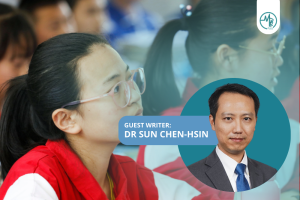Wendy Williams, the iconic talk show host, has publicly shared her diagnosis of primary progressive aphasia and frontotemporal dementia.
These conditions have presented significant challenges in her life. Despite these obstacles, Williams continues to showcase her resilience and trademark sense of humour while receiving the necessary care and support. We enlisted neurosurgeon Dr Prem Pillay from Singapore Brain Spine Nerves Centre to share more about Aphasia.
What is Aphasia? A Complex Language Disorder
Aphasia is a language impairment that arises from damage to the cortical centre for language, primarily due to various brain diseases and disorders. Dr Pillay explains, “Aphasia is a communication disorder that affects a person’s ability to speak, understand, read, and write. It is caused by damage to the parts of the brain responsible for language. People at risk for aphasia include those who have suffered a stroke, traumatic brain injury, or have a brain tumor or infection. Aphasia affects communication by impairing a person’s ability to understand and produce language. This can lead to difficulties in expressing thoughts, understanding others, reading, and writing.”
Aphasia affects the ability to comprehend and formulate spoken and written words. This function is rooted in the brain’s language area, typically located in the dominant hemisphere. The presentation of aphasia varies significantly depending on the location of the brain lesion. Fluent aphasia is characterised by speech that appears normal in rhythm and syntax but may include made-up words or incorrect sounds.
“Neuro Specialists diagnose aphasia through a combination of medical history, physical examination, language testing, MRI (Magnetic Resonance Imaging) brain scans and in certain cases PET(Positron Emission Tomography) brain scans. Common causes of aphasia are brain injury, stroke, brain tumours such as gliomas and brain metastases, from a lung cancer or breast cancer for example; and brain Infection”, Dr Pillay states.
Non-fluent aphasia involves difficulty producing words, omitting words, and speaking in short sentences. Specific syndromes are associated with both fluent and non-fluent aphasia. Each is defined by unique patterns of speech fluency, comprehension, and repetition abilities.
Dr Pillay also shared the treatment options available. He explained, “Removal of Brain Tumors by Micro Surgery has reversed aphasia in patients. Rehabilitation typically involves speech and language therapy, which aims to restore language skills, teach compensatory strategies, and find alternative methods of communication. Other treatments under investigation include behavioural therapies, electrical brain stimulation techniques, and medications.”
Frontotemporal Dementia: An In-Depth Look
Frontotemporal Dementia (FTD) is a term for a range of neurocognitive disorders. It leads to progressive dysfunction in behaviour, executive functioning, and language. Recognised as the third most prevalent form of dementia, FTD particularly affects the frontal and temporal lobes of the brain. This condition typically occurs in individuals aged 45 to 65, making it a significant cause of early-onset dementia.
Predicting the molecular pathology based on clinical and radiological phenotypes remains a challenge. Though certain patterns have been recognised, the genetically mediated forms of FTD have been at the forefront of research for diagnosis and intervention. These conditions also underscore the importance of understanding the role of pathogenic proteins in brain network targeting and destruction, which characterises FTD as a “molecular nexopathy”.
FTD not only disrupts the lives of those directly affected, but also poses significant challenges for their families. With the current focus on research and clinical trials, there is hope for better understanding and diagnosis.
Wendy’s Resilience and Public Awareness
Williams’ journey since her diagnosis with primary progressive aphasia and FTD in 2023 is a testament to her strength and the complexities of living with such conditions. This phase of her life has not only been about managing the symptoms, but also navigating the changes in her career and public life.
Williams has faced these challenges with resilience, supported by a strong network of family, friends, and medical professionals who ensure she receives the best care possible. Her situation has brought to light the significance of understanding and empathy for those with neurological conditions, highlighting the need for public awareness and support. Williams’ story, marked by her humour and grace, highlights the importance of resilience and community in facing life-altering diagnoses.
Image credit: Lloyd Bishop/NBC/NBCU Photo Bank via Getty Images
References
- What to know about aphasia after Wendy Williams’ primary progressive aphasia, frontotemporal dementia diagnosis. (n.d.). Retrieved March 5, 2024, from https://news.yahoo.com/know-aphasia-wendy-williams-primary-191549452.html?guccounter=1
- Aphasia. (2024, January 1). PubMed. https://pubmed.ncbi.nlm.nih.gov/32644741/
- Sivasathiaseelan, H., Marshall, C. R., Agustus, J. L., Benhamou, E., Bond, R. L., Van Leeuwen, J. E. P., Hardy, C., Rohrer, J. D., & Warren, J. D. (2019, March 29). Frontotemporal Dementia: A Clinical Review. Seminars in Neurology. https://doi.org/10.1055/s-0039-1683379
- Khan, I., & De Jesus, O. (2023, August 23). Frontotemporal Lobe Dementia. StatPearls – NCBI Bookshelf. https://www.ncbi.nlm.nih.gov/books/NBK559286/













